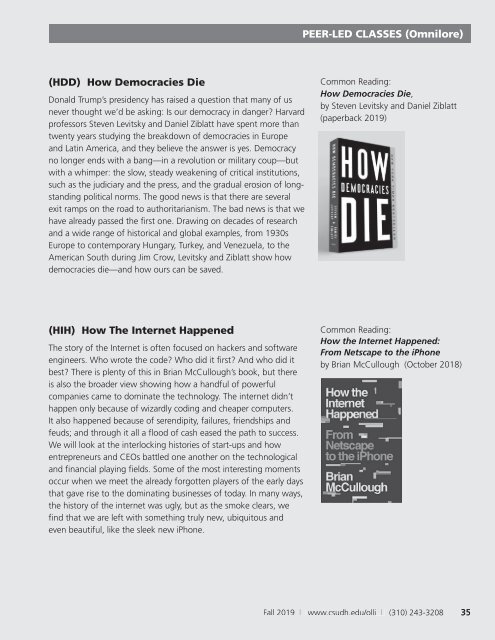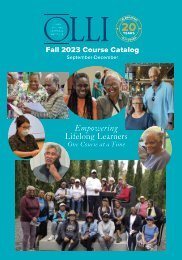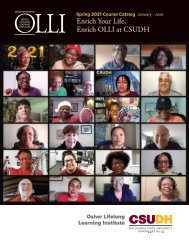Fall 2019 OLLI Catalog (Interactive)
The Osher Lifelong Learning Institute (OLLI) at California State University Dominguez Hills is a program of educational, cultural, and social opportunities for retired and semi-retired individuals age 50 and above. Members experience taking courses in a relaxed atmosphere for the pure pleasure of learning. For more info, visit: https://csudh.edu/olli
The Osher Lifelong Learning Institute (OLLI) at California State University Dominguez Hills is a program of educational, cultural, and social opportunities for retired and semi-retired individuals age 50 and above. Members experience taking courses in a relaxed atmosphere for the pure pleasure of learning.
For more info, visit:
https://csudh.edu/olli
You also want an ePaper? Increase the reach of your titles
YUMPU automatically turns print PDFs into web optimized ePapers that Google loves.
PEER-LED CLASSES (Omnilore)<br />
(HDD) How Democracies Die<br />
Donald Trump’s presidency has raised a question that many of us<br />
never thought we’d be asking: Is our democracy in danger? Harvard<br />
professors Steven Levitsky and Daniel Ziblatt have spent more than<br />
twenty years studying the breakdown of democracies in Europe<br />
and Latin America, and they believe the answer is yes. Democracy<br />
no longer ends with a bang—in a revolution or military coup—but<br />
with a whimper: the slow, steady weakening of critical institutions,<br />
such as the judiciary and the press, and the gradual erosion of longstanding<br />
political norms. The good news is that there are several<br />
exit ramps on the road to authoritarianism. The bad news is that we<br />
have already passed the first one. Drawing on decades of research<br />
and a wide range of historical and global examples, from 1930s<br />
Europe to contemporary Hungary, Turkey, and Venezuela, to the<br />
American South during Jim Crow, Levitsky and Ziblatt show how<br />
democracies die—and how ours can be saved.<br />
Common Reading:<br />
How Democracies Die,<br />
by Steven Levitsky and Daniel Ziblatt<br />
(paperback <strong>2019</strong>)<br />
(HIH) How The Internet Happened<br />
The story of the Internet is often focused on hackers and software<br />
engineers. Who wrote the code? Who did it first? And who did it<br />
best? There is plenty of this in Brian McCullough’s book, but there<br />
is also the broader view showing how a handful of powerful<br />
companies came to dominate the technology. The internet didn’t<br />
happen only because of wizardly coding and cheaper computers.<br />
It also happened because of serendipity, failures, friendships and<br />
feuds; and through it all a flood of cash eased the path to success.<br />
We will look at the interlocking histories of start-ups and how<br />
entrepreneurs and CEOs battled one another on the technological<br />
and financial playing fields. Some of the most interesting moments<br />
occur when we meet the already forgotten players of the early days<br />
that gave rise to the dominating businesses of today. In many ways,<br />
the history of the internet was ugly, but as the smoke clears, we<br />
find that we are left with something truly new, ubiquitous and<br />
even beautiful, like the sleek new iPhone.<br />
Common Reading:<br />
How the Internet Happened:<br />
From Netscape to the iPhone<br />
by Brian McCullough (October 2018)<br />
<strong>Fall</strong> <strong>2019</strong> | www.csudh.edu/olli | (310) 243-3208 35

















